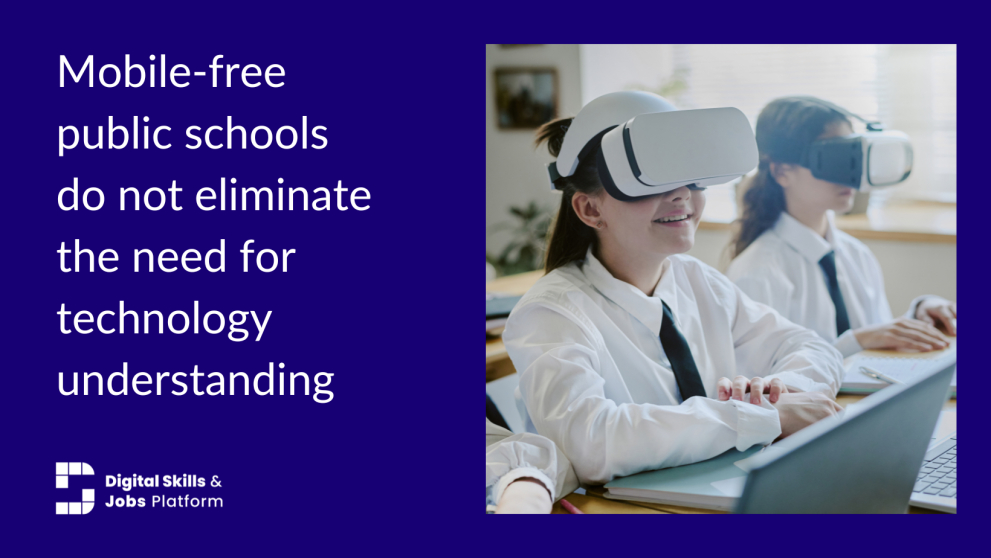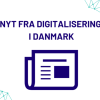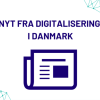Mobile-free public schools do not eliminate the need for technology understanding

From the next school year, mobile phones at Danish primary schools will be no more. But we are blind to the fact that understanding technology has become a democratic necessity. Not only do we need to get mobile phones out of our children's school lives, but we also should try to improve our own understanding of technology.
Denmark might be doing most things right, yet some issues remain, looming over recent progress in key areas. An entire generation of children in Denmark is currently growing up with a huge and uncritical consumption habit of digital technologies. This poses a set of challenges, but also turns them into easy prey for tech giants, who make money off of kids' doom scrolling.
It seems like we have come to a political crossroads - or rather, perhaps we have been here for a while now. Should the Danish population of the future be content with consuming technology with few to no limits - or should we put the necessary actions in place to enable the next generation of Danes to understand, create, and critically relate to digital technologies in a more informed way than is the case today?
Acting today for a better tomorrow: the case of Dansk IT
It is a non-choice. We have to do the latter, of course, and it is urgent. But how? At Dansk IT, Denmark's largest network for IT users, we work across three focus areas:
- User Competences: The ability to use digital tools efficiently and safely.
- Reflective skills: The ability to critically assess the potential and impact of technology.
- Creation skills: The ability to develop and adapt technology to one's own needs and society's challenges.
Each of them can be used as the cornerstone of a new and more up-to-date education policy that our children and young people urgently need.
Our schools: ground zero
The remark that education is slow to reflect changes and developments in the labour market is not a myth. Indeed, technology comprehension remains a non-compulsory subject in Danish schools. In other words, we fail to show to our students the extent to which digital technologies impact our day-to-day lives.
This is not just a pedagogical problem: it can be viewed as a democratic one too. Introducing technology understanding in line with mathematics and Danish should be a priority given the pace of developments in the tech sector. It's not just about classic IT skills, but also about building them into a broader context, because IT is rapidly spreading beyond the lives we live now and even more in the future.
Our children and young people should be educated to see through the tech giants' polished entertainment offerings and social media ads. They should know about the intricate and subtle ways algorithms affect their choices and modifies the content they see, about the way social media executives have succeeded in turning attention into capital, or about the dangers of digital services eroding physical communities. Given the potential consequences, the need for knowledge becomes akin to living and working in today's world. For this very reason, the EU recommends that technology understanding be included as a compulsory subject in upper secondary education - and Denmark should follow suit.
At the same time, the teaching of digital ethics and forms of communication should be strengthened. Seen in isolation, screen bans are a coarse-grained solution to a complex educational challenge, and bans do not eliminate the real problem. We need digital education, not digital rehab.
At a crossroads: tech understanding and education
When we hear the word "technological understanding", it may sound a bit dry - scientific even. But today, technology has permeated the physical world to such an extent, that students across levels of education should aim for greater insight into technological impact - and how it impacts the field they are in, or planning to go into. This is especially the case in higher education, where to some degree, students have more or less chosen a path. For example, how are future lawyers supposed to relate to AI and use it in jurisprudence? How should teachers and educators deal with children growing up with digital communities? How should economists navigate a reality where decisions are increasingly made by algorithms?
If we do not act now, we will be left with a small digital elite that shapes society while reducing the majority to passive consumers. This is not just a labour market problem. This is a threat to the functioning of democracy itself.
Digital literacy and skills: key figures and attitudes
Digital skills are not just about being able to operate technology. They are also about being able to engage in communities, debate and make informed choices.
A new report from the University of Southern Denmark shows, among other things, that Danes are well aware of the market-leading tech giants, but also that their assessment of them varies significantly. Over half of people surveyed said they had a positive impression of Microsoft, while just 5% of respondents considered X (formerly Twitter) a positive platform. Other major themes in the study are concerns about children's well-being and the spread of misinformation.
The majority of Danes believe that the responsibility for regulating tech giants lies with politicians, the EU and companies themselves. But many also point out that we have a personal responsibility to opt out of problematic products or platforms. Nevertheless, the report documents that there is often a long way from position to action.
The data highlights our point: we cannot leave the responsibility to the individual. Society as a whole must take responsibility and act – through regulation, information and a stronger drive for digital education. It is our cohesion that is at stake here. If we want to maintain a democratic and inclusive society, we must put digital literacy at the top of the political agenda - not throwing mobile phones out of schools.





